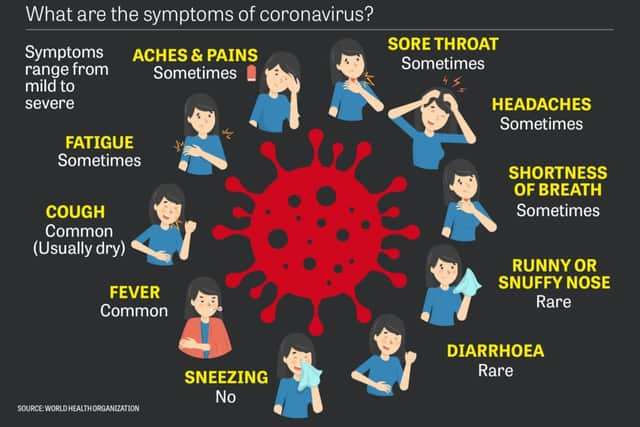Here’s how you can keep socialising and avoid loneliness when you are social distancing or self-isolating


As the Covid-19 strain of coronavirus continues to spread, it looks like social isolation could become the new normal for lots of people around the world.
While social isolation preserves our physical health, the loneliness it brings could present a challenge for our mental well-being.
Advertisement
Hide AdAdvertisement
Hide AdLuckily we live in age with the internet, and there are lots of ways of keeping in touch and maintaining a sense of connection, even when we can’t be together.


Here are some ways you can stay connected and tackle loneliness over the coming weeks
(Photo: WHO)
Pick up the phone
Phoning your friends and family is an easy way to stay in touch. If you have a smartphone, try video calls, as seeing someone’s facial expressions can help increase connection.
Call your grandparents, older relatives, or anyone you feel could benefit from hearing a friendly voice.
Arrange social events - but have them online
Advertisement
Hide AdAdvertisement
Hide AdIf you aren’t able to isolate with family, flatmates or a partner, try arranging meet-ups online.
You can open a bottle of wine or have a few beers with your friends and catch up on the latest from your living room.
Some people are even continuing online dating and arranging to have their first date by video call, getting to know each other through a screen until they can meet up.
Talk to your colleagues if you are working from home
A lot of the human contact you have is with people at work as we all spend about eight hours a day there.
Advertisement
Hide AdAdvertisement
Hide AdWorking from home can feel quite lonely and affect your productivity and morale. Bouncing ideas around is a big part of working in an office.
Stay in touch with your team using online workspaces, such as Slack or Zoom, and continue to have meetings through video calls. And, if you think someone might be struggling, reach out.
Play online games
It can be hard to find things to talk about when you are meeting up online every day, so find an activity you can all do together.
There are some online games you can all sign up to and play together. Search for free multiplayer games until you find something you all like.
Netflix party extension
Advertisement
Hide AdAdvertisement
Hide AdAnother idea is to host a Netflix party so you don’t have to watch your favourite series alone.
Netflix Party is a Google Chrome extension which allows you to watch films and TV series while chatting with your friends.
Social media
Following positive social media can help you to stay connected while stuck at home.
Start group chats or Facebook groups where you don’t have them already to keep groups together.
Advertisement
Hide AdAdvertisement
Hide AdPeople are posting under a number of hashtags including #togetherathome to boost morale.
There are also mutual aid Facebook groups set up across the country – mostly to arrange for people to deliver things to vulnerable people but if you have no one to talk to, you could ask if someone can call you just so you have some human interaction.
Coronavirus: the facts
What is coronavirus?
COVID-19 is a respiratory illness that can affect lungs and airways. It is caused by a virus called coronavirus.
What caused coronavirus?
The outbreak started in Wuhan in China in December 2019 and it is thought that the virus, like others of its kind, has come from animals.
How is it spread?
Advertisement
Hide AdAdvertisement
Hide AdAs this is such a new illness, experts still aren’t sure how it is spread. But similar viruses are spread in cough droplets. Therefore covering your nose and mouth when sneezing and coughing, and disposing of used tissues straight away is advised. Viruses like coronavirus cannot live outside the body for very long.
What are the symptoms?
The NHS states that the symptoms are: a dry cough, high temperature and shortness of breath - but these symptoms do not necessarily mean you have the illness. Look out for flu-like symptoms, such as aches and pains, nasal congestion, runny nose and a sore throat. It’s important to remember that some people may become infected but won’t develop any symptoms or feel unwell.
What precautions can be taken?
Washing your hands with soap and water thoroughly. The NHS also advises to cover your mouth and nose with a tissue or your sleeve (not your hands) when you cough or sneeze; put used tissues in the bin immediately and try to avoid close contact with people who are unwell. Also avoiding touching eyes, nose and mouth unless your hands are clean.
What should I do if I feel unwell?
Stay at home if you have either:
- a high temperature – this means you feel hot to touch on your chest or back (you do not need to measure your temperature)- a new, continuous cough – this means coughing a lot for more than an hour, or 3 or more coughing episodes in 24 hours (if you usually have a cough, it may be worse than usual)
Advertisement
Hide AdAdvertisement
Hide AdDo not go to a GP surgery, pharmacy or hospital. Use the 111 online coronavirus service to find out what to do.
When to call NHS 111
NHS 111 should be used if you feel unwell with coronavirus symptoms, have been in a country with a high risk of coronavirus in the last 14 days or if you have been in close contact with someone with the virus.
Sources: World Health Organisation and NHS